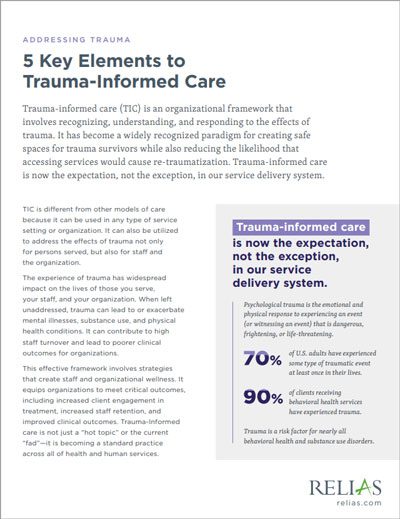Trauma-informed care is a system of care that creates safe spaces for those who have experienced trauma and reduces the likelihood of causing re-traumatization. The trauma-informed care framework includes recognizing, understanding, and responding to the effects of trauma in the populations you serve. It also re-frames trauma responses as adaptive, rather than pathological; they are the individual’s best attempt at coping with a traumatic experience.
While many behavioral health and social service organizations have moved toward implementing trauma-informed practices, it is rarely recognized in organizations serving intellectual and developmental disabilities (IDD). The impact and prevalence of trauma among individuals with IDD is hard to ignore and implementing a trauma-informed system of care at your organization can greatly benefit the people you serve.
Trauma is common for people with IDD
People with IDD are just as likely to experience and be affected by a traumatic event as anyone else. Personal injury, natural disasters, or mass events like the coronavirus pandemic can cause an individual to experience symptoms of post-traumatic stress.
However, there are some types of trauma that individuals with IDD are more likely to experience. Abuse, interpersonal violence, and neglect are unfortunately common experiences in this population. In fact, the issue of abuse among individuals with IDD is so pervasive, NPR did a series of reports on the topic.
According to the Center on Victimization and Safety, people with disabilities are at a higher risk of victimization than the general population, including the following :
- 3 times more likely to experience rape, sexual assault, aggravated assault, and robbery
- 3 times more likely to be sexually abused in childhood
- 6 times more likely to experience abuse or neglect in childhood
There are a plethora of reasons behind these startling statistics. Individuals who require assistance with activities of daily living (e.g. bathing, dressing), are vulnerable to caregivers or direct support staff who may be abusive or neglectful. Individuals who are non-verbal or need assistance with communication are often not able to report abuse that has occurred, or if they do report abuse, they are often not considered to be reliable reporters.
Additionally, people with IDD are often isolated from their communities and have small social networks – two protective factors that could help reduce the incidence of abuse. Perhaps more unfortunately, many abuse response organizations – whether they be domestic violence shelters or abuse hotlines – are not accessible to people with disabilities.
Other experiences that are unique to individuals with disabilities can be considered traumatic. For example, frequent changes in caregivers, being institutionalized or hospitalized, and frequent lack of choice and bodily autonomy are all scenarios that can feel traumatic.
Recognizing the symptoms of trauma
Recognizing whether an individual with IDD has experienced trauma, especially if they have limited cognitive or communication capabilities, can be difficult for caregivers to determine. Some signs and symptoms of trauma that can appear in individuals with IDD include:
- Cognitive effects — Difficulty acquiring new skills, difficulty processing new information, poor verbal communication or loss of communication ability
- Physiological effects — Stomachaches, headaches, difficulty sleeping, loss of acquired developmental skills, bed-wetting and soiling
- Behavioral effects — Aggressive behavior, screaming or crying excessively, irritable mood, verbally abusive behavior, being fearful or avoidant of people or situations
Often, some symptoms of trauma are interpreted as challenging behaviors or “outbursts” by staff. Pacing, yelling, or self-injurious behavior can be a response to a triggering event that is reminiscent of a traumatic experience. It is critical that staff are trained in ways to prevent and de-escalate crisis behavior, rather than quickly responding with restraints or therapeutic holds, as these interventions themselves can be traumatizing or re-traumatizing for some individuals.
What can IDD organizations do?
The challenge of addressing trauma in the IDD population can feel daunting. Thankfully, there are several ways organizations can address the high prevalence of trauma among individuals served.
1. Implement trauma-informed care practices
Trauma-informed care is a model that can be adapted for any human service organization, including IDD organizations. There are several resources available to help organizations begin to work toward implementing trauma-informed care, including content from Relias.
2. Provide training to all staff on trauma
All staff at your organization – including administrative staff, direct support professionals, and supervisors – should be given training on the basics of trauma and trauma-informed care. Quality training on other topics, such as crisis management, can also benefit staff in creating trauma-informed ways of working with individuals. ANCOR has a webinar series for purchase that addresses how IDD organizations can better address trauma for persons served.
3. Provide self-care and wellness resources to direct support staff
One risk factor for abuse and neglect toward individuals with IDD is support staff who are over-stressed or experiencing burnout. Supporting employee wellness serves as a way to prevent abuse, neglect, and exploitation. It also helps reduce turnover of DSPs, another factor that can put persons served at risk of abuse.
4. Recognize that people with disabilities are most often abused by their caregivers
The hard truth is that people with disabilities are more likely to be abused by a caregiver or someone they know, which can include direct support staff. IDD organizations must be diligent in addressing allegations of abuse, know when to involve law enforcement, and create partnerships with local domestic and sexual violence organizations.
5. Recognize that people with IDD can benefit from therapy
One common misconception is that individuals with IDD who have experienced trauma will not benefit from trauma-focused therapy. However, many different types of therapy have been found to be effective in treating individuals with IDD. Anyone who has survived a traumatic experience – people with IDD included – can benefit from trauma treatment and find resilience in the face of adversity.

The Key Elements of Trauma Care
Learn more about the trauma-informed care framework and how to implement it at your organization. Read the 5 Key Elements of Trauma-Informed Care.
Download the white paper →





